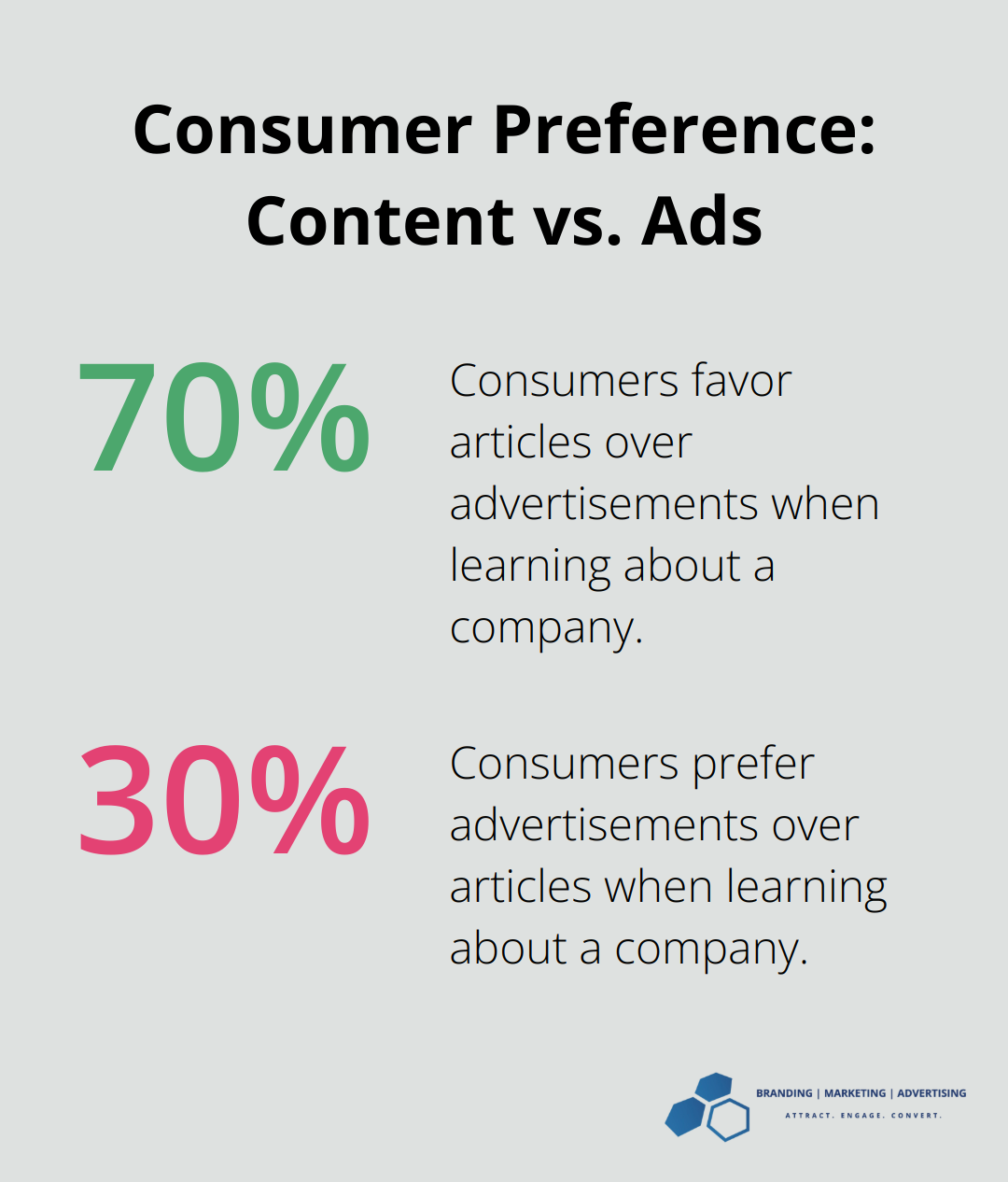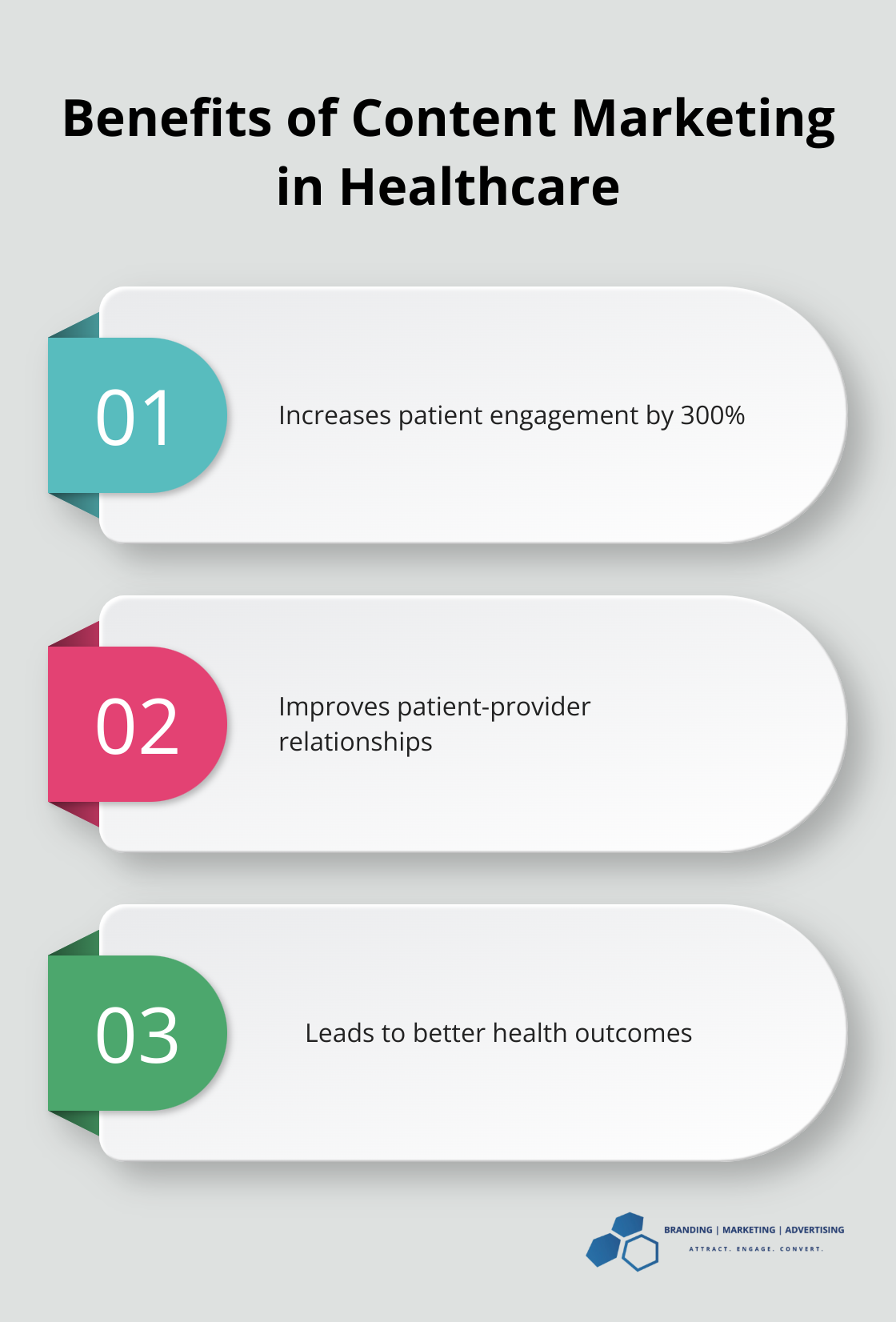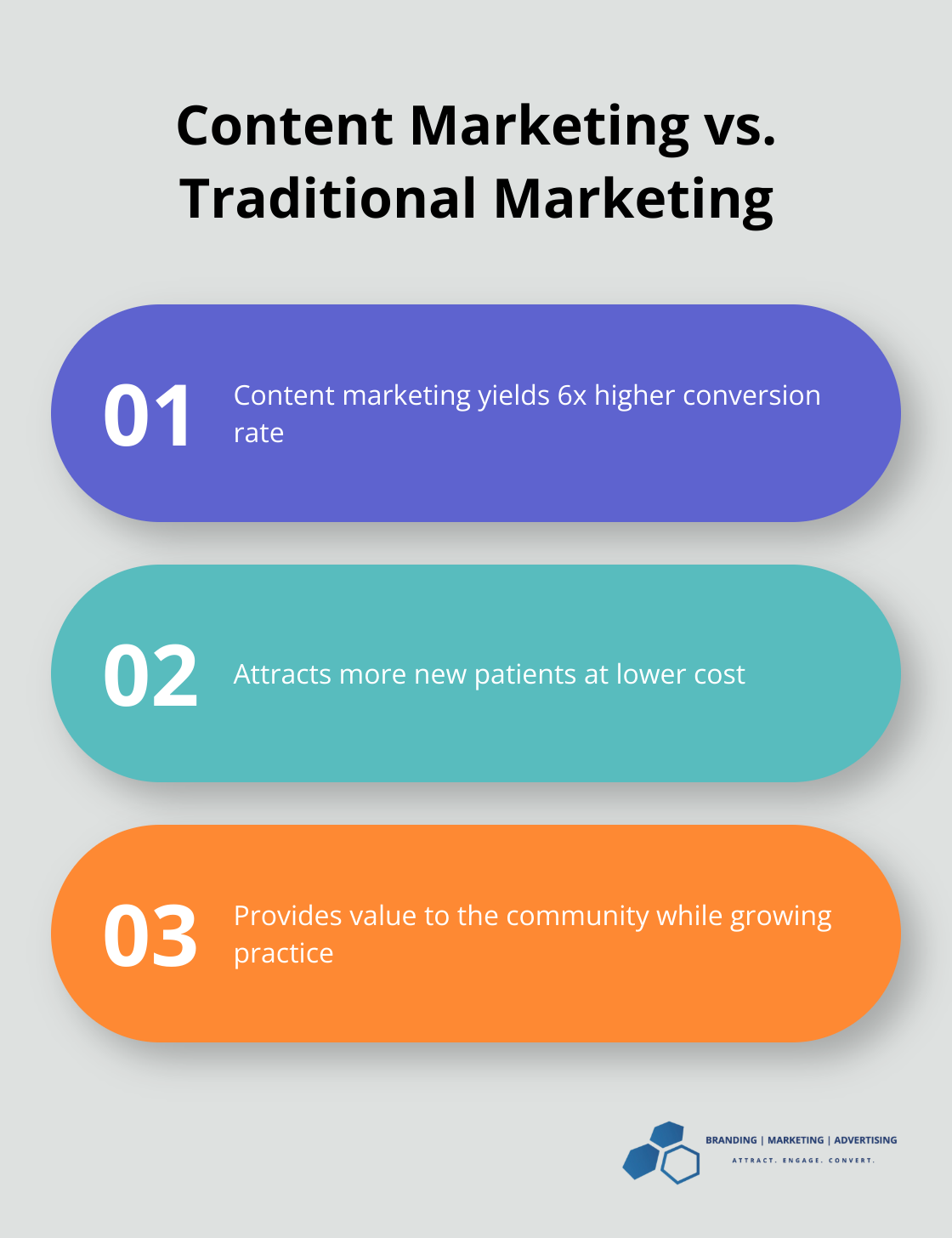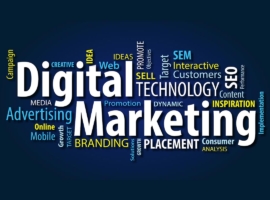Why Content Marketing Matters for Healthcare Providers
At Branding | Marketing | Advertising, we’ve seen firsthand how medical content can transform healthcare providers’ relationships with patients.
Content marketing in healthcare isn’t just about promoting services; it’s about building trust, educating patients, and improving overall health outcomes.
In this post, we’ll explore why content marketing matters for healthcare providers and share effective strategies to connect with patients in meaningful ways.
Why Healthcare Providers Need Content Marketing
Content marketing revolutionizes how healthcare providers connect with patients. This powerful strategy builds trust, educates patients, and drives practice growth. Let’s explore the key reasons why content marketing matters for healthcare providers.
Patients Prefer Content Over Ads
Research shows that 70% of consumers favor articles over advertisements when learning about a company. For healthcare providers, this translates to a clear advantage: your blog posts and educational videos will likely gain more patient trust than traditional advertising methods. Sharing valuable health information positions you as a knowledgeable and caring provider in your patients’ eyes.

Content Skyrockets Patient Engagement
Healthcare providers who implement content marketing strategies witness a remarkable 300% increase in patient engagement. This statistic represents more than just numbers-it signifies more appointments, improved adherence to treatment plans, and better health outcomes. Engaged patients take a more active role in their health journey, leading to stronger patient-provider relationships.

SEO Amplifies Your Online Presence
The importance of search engine optimization (SEO) cannot be overstated, as 93% of online experiences start with a search engine. Creating SEO-optimized content dramatically increases your visibility to potential patients. In fact, healthcare providers who prioritize SEO experience a tenfold increase in organic website traffic. This boost in visibility means more people find your practice when searching for health information or local providers.
Empowering Patients Through Education
Around 52% of individuals searched for health-related information and symptoms online in 2022, and this proportion is still growing. Providing this information serves a dual purpose: it not only markets your services but also empowers patients to make informed decisions about their health. This approach leads to improved health outcomes and fosters stronger patient-provider relationships.
Cost-Effective Marketing Solution
Content marketing proves to be a highly efficient strategy, yielding a conversion rate six times higher than traditional marketing methods. For healthcare providers, this translates to attracting more new patients at a lower cost per acquisition. It offers an effective way to grow your practice while simultaneously providing value to your community.

Content marketing represents a fundamental shift in patient communication for healthcare providers. The focus on creating valuable, educational content builds trust, improves patient outcomes, and fuels practice growth. These benefits make content marketing an indispensable tool in today’s healthcare landscape.
Now that we understand why content marketing matters, let’s explore effective strategies healthcare providers can use to connect with patients in meaningful ways.
Proven Content Marketing Tactics for Healthcare Providers
Healthcare providers can leverage several effective content marketing strategies to connect with patients and build trust. These tactics increase visibility, educate patients, and lead to better health outcomes.
Craft Compelling Blog Posts and Articles
Healthcare providers should focus on creating informative blog posts and articles that address common patient concerns. Identify frequently asked questions from your patients and turn them into detailed, easy-to-understand blog posts. A dentist might write about “5 Ways to Prevent Tooth Decay” or “Understanding the Benefits of Regular Dental Check-ups.”
Harness the Power of Social Media
Social media platforms offer healthcare providers a unique opportunity to engage with patients and share valuable health information. Maintain HIPAA compliance by never sharing identifiable patient information without explicit consent.
Create Engaging Videos and Infographics
Visual content can significantly boost patient engagement. Create short, informative videos explaining common procedures or discussing preventive care tips. Infographics are also powerful tools for simplifying complex medical information. An infographic on “The Importance of Vaccinations” can be more impactful than a text-heavy article on the same topic.
Implement a Targeted Email Newsletter Strategy
Email newsletters remain an effective way to keep patients informed and engaged. A well-crafted newsletter can include health tips, practice updates, and links to your latest blog posts or videos. Personalization is key – segment your email list based on patient demographics or health conditions to ensure the content is relevant to each recipient. This targeted approach can lead to higher open rates and better patient engagement.
Optimize for Local Search
Local search optimization ensures your practice appears in local search results. Claim and optimize your Google Business Profile, ensure consistent NAP (Name, Address, Phone number) information across all online directories, and encourage patient reviews. LSO helps potential patients find your practice when searching for healthcare providers in their area.
These content marketing strategies can significantly enhance a healthcare provider’s online presence and build stronger relationships with patients. The next chapter will address the challenges healthcare providers might face when implementing these strategies and provide solutions to overcome them.
Navigating Healthcare Content Marketing Hurdles
Healthcare content marketing presents unique challenges. We’ll explore how to overcome these obstacles and create impactful, compliant content that resonates with patients.
Ensuring HIPAA Compliance
HIPAA compliance is essential in healthcare content marketing. Violating patient privacy can result in severe penalties and reputation damage. To maintain compliance:
- Obtain patient consent before using or disclosing their PHI for marketing purposes.
- Never use real patient information or images without explicit written consent.
- Avoid sharing details that could potentially identify a patient.
- Use generic examples or create fictional patient scenarios for case studies.
- Train all content creators on HIPAA regulations and best practices.
- Implement a thorough review process to catch potential violations before publication.
Tackling Sensitive Topics
Healthcare often involves discussing sensitive or uncomfortable topics. To address these effectively:
- Use clear, factual language without being overly clinical or alarmist.
- Provide context and explain why the topic matters for patient health.
- Offer resources for further information or support.
- Use empathetic language to make readers feel understood and supported.
- Consider partnering with patient advocacy groups for guidance on addressing sensitive issues.
Striking the Right Balance
Medical accuracy is vital, but overly technical content can alienate readers. To balance accuracy and readability:
- Use plain language to explain complex medical concepts.
- Include a glossary for necessary medical terms.
- Use analogies (sparingly) only when they truly clarify a concept.
- Break down information into digestible chunks with subheadings and short paragraphs.
- Have both medical professionals and non-medical readers review content for clarity.
- Consider using videos to demonstrate medical procedures, explain complex concepts, and provide patient education.
Staying Current in a Fast-Paced Field
Medical knowledge evolves rapidly. To keep your content up-to-date:
- Set up Google Alerts for relevant medical topics to stay informed about new developments.
- Review and update existing content regularly, especially for time-sensitive topics.
- Collaborate with medical professionals to ensure accuracy of new information.
- Clearly date all content and include last-updated timestamps.
- Create an editorial calendar that includes regular content audits.
Maintaining Consistency Across Platforms
Consistency in messaging and branding across various platforms (website, social media, email newsletters) strengthens your healthcare provider’s identity. To achieve this:
- Develop a style guide that outlines tone, voice, and key messaging points.
- Create templates for different types of content to ensure visual consistency.
- Use a content calendar to plan and coordinate messaging across platforms.
- Regularly audit your content to ensure it aligns with your brand guidelines.
- Train all team members involved in content creation on your brand standards.
By addressing these challenges, healthcare providers can create effective content marketing strategies that boost neighborhood visibility and engage their target audience while maintaining compliance and professionalism.
Final Thoughts
Content marketing has become an essential tool for healthcare providers in today’s digital landscape. Medical content offers numerous benefits, from building trust and credibility to educating patients and increasing visibility. Healthcare providers can engage patients more effectively by creating valuable, informative content, which leads to improved health outcomes and stronger patient-provider relationships.
The statistics speak for themselves: a 300% increase in patient engagement, a tenfold boost in organic website traffic, and a six times higher conversion rate compared to traditional marketing methods. These numbers underscore the power of content marketing in healthcare. Moreover, with 93% of online experiences starting with a search engine, SEO-optimized content plays a vital role in reaching potential patients.
Success in healthcare content marketing requires a patient-centered approach that addresses needs, concerns, and questions while maintaining HIPAA compliance and medical accuracy. We at Branding | Marketing | Advertising encourage healthcare providers to invest in content marketing strategies (which can include informative blog posts, engaging videos, and targeted email newsletters). This investment will enhance your online presence and contribute to better-informed, more engaged patients, ultimately leading to improved health outcomes and a thriving practice.











